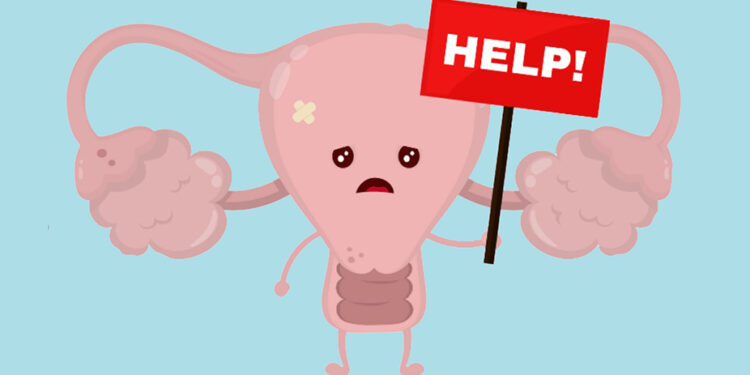Endometriosis occurs when the endometrial tissue implants outside the uterus, around places such as ovaries, fallopian tubes, and pelvic organs. This abnormal implantation of the endometrial tissue causes scar tissue development and inflammation and alters the immune system. It also leads to unexplained infertility by causing hormone imbalance and altering the quality of eggs. Here’s how endometriosis contributes to infertility:
Distorted Pelvic Anatomy
Endometriosis causes mechanical disruptions, such as pelvic adhesions that distort the pelvic anatomy and reduce a woman’s ability to get pregnant. The distorted pelvic anatomy affects conception by impairing the release and pick-up of eggs from the ovary. It may also alter the ability of sperm to move by blocking them from swimming into the fallopian tube. The mechanical disruptions and anatomical distortion of the pelvis cause disordered contraction of the uterus, which inhibits conception. The distortion of the pelvis also directly affects fertilization. It impairs ovum and embryo transport.
Ovulatory Dysfunction
Endometriosis leads to the formation of an endometrioma, which is a benign cyst with a permeable capsule. These are abnormal noncancerous ovarian sacs filled with liquid contents resulting from the blockage of the body’s natural drainage system. These endometriomas cause stretching damage by forcing themselves within the limited space occupied by the follicles. This reduces the amount of functional tissue available to support ovarian function.
Their permeable membrane also allows them to release their cyst contents to the nearby healthy ovarian cortex. The cyst contents cause an imbalance between free radicals and antioxidants within viable cells and damage the healthy ovarian tissue. This directly destroys or prevents the maturation of the eggs and inhibits ovulation. The cyst contents also reduce the maturation of follicles and cause abnormal narrowing in early follicles, a condition called atresia. Atresia may inhibit the formation of new blood vessels and lead to damage of the follicles.
The disease can also cause scar tissue to form in the ovaries. This scar tissue obscures normal blood circulation in the ovaries, reducing oxygen supply, which inhibits the maturation of eggs. This reduces egg quality, impairs proper embryo growth, and may lead to miscarriages.
Inflammation
Endometriosis can also lead to the inflammation of the pelvic structures. If the inflammation becomes chronic, it may increase the concentration of cytokines such as interleukin-1β. Cytokines are small proteins that control the growth and activity of your body’s immune system cells and blood cells. These proteins facilitate communication between cells during immune responses. They also stimulate cells to move towards sites of infection, inflammation, or trauma. High concentrations of these cytokines in follicles can reduce ovarian response.
Chronic inflammation elevates the concentration of the cytokine IL-6 in the peritoneal fluid, which may impair sperm movement. High concentrations of cytokines such as IL-8 and IL-10 can also impair egg-sperm interactions and embryo development. High cytokine concentrations hinder implantation, leading to unexplained infertility.
Fallopian Tube Problems
The endometrial tissue can grow in the fallopian tubes and block them or form scar tissues on the fallopian lining. A blocked or scarred fallopian tube prevents the eggs released by the ovaries from reaching the sperm for fertilization. This directly prevents conception and leads to infertility.
Immune System Dysfunction
Endometriosis makes the immune system dysfunctional. A dysfunctional immune status can reduce libido and lead to irregular menstrual cycles. It can also cause inflammatory responses that may lead to an ectopic pregnancy or miscarriage. This increases the chances of early pregnancy failure and the risk of infertility.
Hormonal Imbalance
Endometriosis alters the hormonal environment of the eggs due to the disruption of hormone production caused by endometriomas. It causes polycystic ovary syndrome, which leads to irregular ovulation and menstrual periods. By interfering with ovulation through hormonal imbalance, endometriosis can make it difficult to get pregnant. Hormonal imbalances lead to ovarian cysts, which increase the risk of infertility. Endometriosis may elevate estrogen above normal levels, leading to premature ovarian failure and increased risk of infertility.
Get Treatment for Your Unexplained Infertility
Endometriosis can cause infertility through various pathways, including hormonal imbalance, ovulatory dysfunction, inflammation, and more. This disease and its related infertility issues can be treated through specialized care with the help of a professional fertility expert. Contact a fertility clinic today to help you identify and address the cause of your unexplained infertility.






